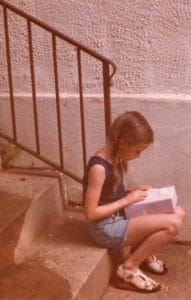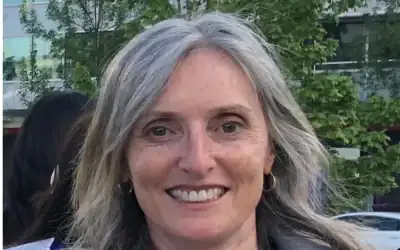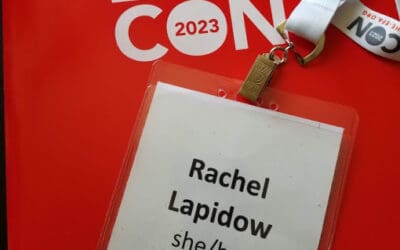“Can anyone find the mistake?” Mrs. Bressette, tall and slim with close-cropped black hair, pointed to a picture of a construction site with a yellow sign in front that read, DEVELOPEMENT COMING SOON.
We stared at the book. We were the advanced spellers, sitting at our own table on the left side of the fourth-grade classroom. We were silent as we contemplated possible answers.
Before Jeffrey or Erik got a chance, I chirped, “No ‘e’ after the ‘p’!”
Mrs. Bressette beamed at me. “Yes!” she said. “ ‘Develop’ has no ‘e’ at the end, unlike ‘envelope.’ Doesn’t that look a little funny?”
I could feel Erik glowering, but I kept my eyes on our teacher. “Develop” with no final “e.” Another gem for my treasure chest.
The Halcyon Grammar Lessons of Yore
As a kid, I had a steel-trap brain for details, especially verbal ones. Middle names, birthdays, spelling—they just stuck to me. I didn’t have to work at it.
Sometimes it was embarrassing, like when a classmate would mention her cousins were visiting from the South and I knew them all by name.
Strange as it sounds, some of my most vivid childhood moments involve watching my teacher write interesting words on the blackboard: “erasure,” “contrails,” “gosling.” I would drink in grammar and spelling lessons, like my fifth-grade teacher, Mrs. Wilbur, explaining the concept of “you, understood.” Objects of prepositions, how to spot the imperative mood, the difference between a colon and a semicolon . . . these were my elementary school highlights.

For my eighth birthday, I got the game Boggle, as promised and eagerly anticipated. Here I’m savoring the moment when I became an Official Wordsmith.
I didn’t know there was such a thing as copyeditors, and I never dreamed this habit of mine would open the door to a lifelong profession.
A Copyediting Career Finds Me
After college, I got a job as an editorial assistant in the Boston-area office of Blackwell Scientific Publishing, a medical and scientific publisher based in the UK. I logged in authors’ articles, answered editors’ phone calls, and sent out the articles to be copyedited, proofread, typeset, and printed.
I learned that copyeditors and proofreaders get paid to use their head for details to perfect an article for publication. Um, yes, please. Natural fit.
My Blackwell boss and I discussed hyphenation, serial commas, and copyediting symbols. I took a copyediting class at Harvard Extension School, and, seeing my commitment, my boss hired me to proofread, then copyedit a couple journals as a freelancer.
I might have stayed within the world of academic journals if it weren’t for my dear friend Naomi, who moved to New York City and for a job as a production editor at St. Martin’s Press for fiction and nonfiction trade books. She convinced me I could copyedit fiction, and I gave it a shot. I loved it, and I’ve been a copyeditor of trade fiction and nonfiction ever since.
The Truth About Training for Copyeditors
Despite a long, rewarding career as a copyeditor, I’ve had very little training. I’ve only taken three classes. I’ve read just a handful of editing-related books. My quirky brain has brought me this far.
The other copyeditors I know are like me: we might not be able to diagram every sentence or name the rule the author’s violating, but instinct gets us through.
I’m all for training, and I enjoy developing editorial training courses for Editorial Arts Academy. But copyediting is a job you can do with just a little relevant education and your innate tendencies.
If you love rules about grammar, punctuation, and spelling, you might just be a natural.
Wondering whether you’d make a good copyeditor? Take our Book Editor Profile Quiz and find out.



